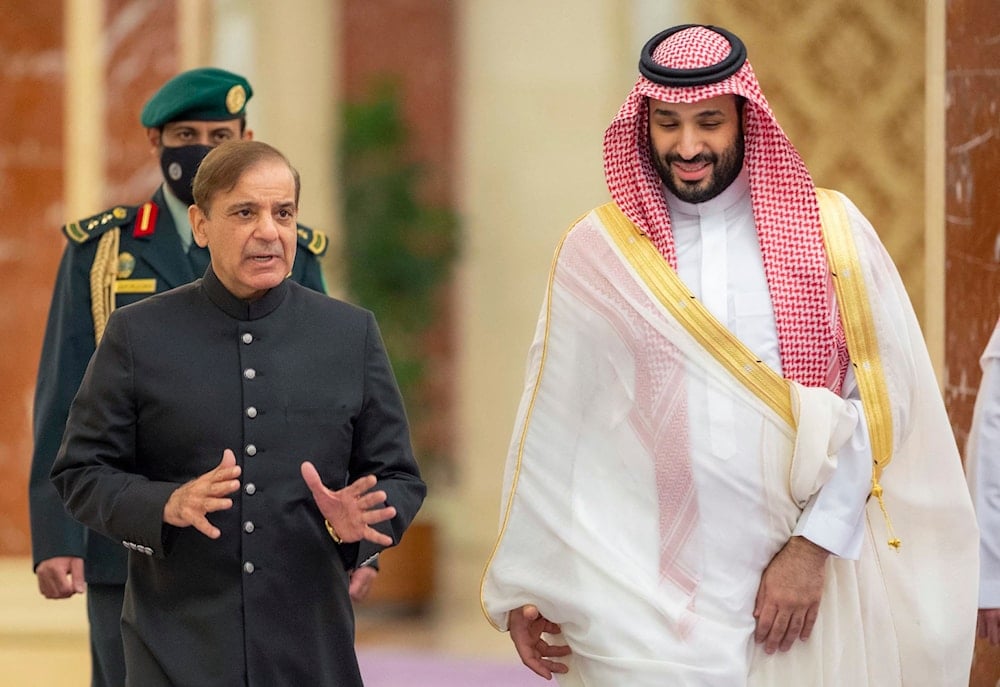Riyadh strengthens Saudi Arabia-Pakistan ties with new defense pact
Saudi Arabia has formalized a strategic defence pact with Pakistan, reinforcing military cooperation and reflecting Riyadh's shift toward diversifying its security alliances.
-

This handout picture provided by the Saudi Royal Palace shows Saudi Arabia's Crown Prince Mohammed Bin Salman (right) welcoming Pakistani Prime Minister Shehbaz Sharif, in Jeddah on April 30, 2022. (AFP)
Saudi Arabia has signed a strategic mutual defense agreement with Pakistan, marking a significant shift in Saudi Arabia-Pakistan ties and signaling Riyadh's intent to diversify its security alliances amid rising regional tensions.
The agreement, signed in Riyadh by Crown Prince Mohammad bin Salman and Pakistan’s Prime Minister Shehbaz Sharif, states that "any aggression against either country shall be considered an aggression against both."
A senior Saudi official described the agreement to the Financial Times as "comprehensive" and capable of utilizing "all defensive and military means deemed necessary depending on the specific threat."
The pact follows "Israel’s" missile strike on Doha, which targeted Hamas political leaders based in Qatar, a move that alarmed Gulf states traditionally reliant on the US as their primary security guarantor. Doha hosts a key American military base and is considered a major non-NATO ally of Washington.
Riyadh informed Washington of the Pakistan agreement after its signing, underscoring its desire for broader strategic autonomy in response to what it sees as increasing unpredictability in US foreign policy and unrestrained military actions by "Israel" across the region.
Read more: Pakistan urges creation of 'Islamic NATO' after Doha strike
Longstanding military, financial ties between Riyadh, Islamabad
Saudi Arabia and Pakistan share a long-standing defense partnership. Islamabad has historically received financial support from Riyadh, and Pakistani military officials have held leadership roles in Saudi-led military coalitions. A former Pakistani army chief once commanded a Saudi-led counterterrorism force based in Riyadh.
“This has been over a year in the making, and based on a two to three-year dialogue,” a Saudi official stated to the Financial Times, highlighting the deliberate planning behind the pact. He also emphasized the kingdom’s commitment to nuclear non-proliferation, despite growing regional security threats.
Read more: Iran, Pakistan deepen ties, cooperation for regional stability
While strengthening ties with Islamabad, Riyadh also maintains economic relations with New Delhi, serving as one of India’s primary oil suppliers. This comes amid ongoing regional tensions between Pakistan and India, including an exchange of air and missile strikes earlier this year that nearly escalated into open war.
Fallout from the war on Gaza
The new pact arrives as Riyadh grows increasingly critical of "Israel’s" war on Gaza, which has lasted nearly two years. Bin Salman has accused "Israel" of committing genocide and has ruled out the possibility of normalizing ties unless there is an end to the war and a clear path toward a Palestinian state.
Although Riyadh previously pursued a comprehensive agreement with Washington that included security guarantees and nuclear cooperation in exchange for normalization with "Israel", the war on Gaza has halted those negotiations.
Read more: Arab-Islamic summit slams Israeli strike on Qatar, urges unity
Despite the deep-rooted military relationship between the Gulf states and the US, analysts suggest that the recent Israeli aggression in Doha may accelerate efforts among Arab states to diversify their defense partnerships, particularly with countries like Pakistan.
"Israel", along with Saudi Arabia, Pakistan, and others, is a member of CENTCOM, the US military’s Central Command. It is also the only nuclear-armed entity in the Middle East, though it has never officially acknowledged its program.
Saudi Arabia's crown prince denounced the attack on Doha as “brutal aggression", calling for Arab, Islamic, and international action in response.

 4 Min Read
4 Min Read










